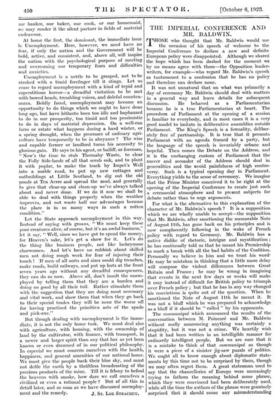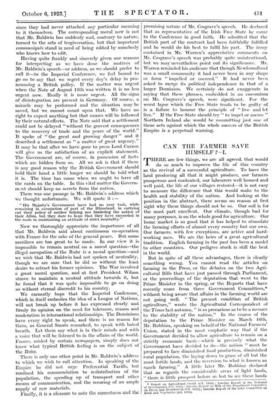THE IMPERIAL CONFERENCE AND MR. BALDWIN.
THOSE who thought that Mr. Baldwin would use the occasion of his speech of welcome to the Imperial Conference to declare a new and definite European policy were disappointed. Although we shared the hope which has been dashed for the moment we by no means agree with those—the Opposition leader- writers, for example—who regard Mr. Baldwin's speech as tantamount to a confession that he has no policy and therefore can declare none.
It was not unnatural that on what was primarily a day of ceremony Mr. Baldwin should deal with matters in a general way and leave details for subsequent discussion. He behaved as a Parliamentarian because he is a true Parliamentarian at heart. The procedure of Parliament at the opening of a session is familiar to everybody, and in most cases it is a very good model to imitate in deliberative assemblies outside Parliament. The King's Speech is a formality, deliber- ately free of partisanship. It is true that it presents Parliament with an agenda framed by a party, but the language of the speech is invariably urbane and hopeful. Then comes the Debate on the Address, and it is the unchanging custom of Parliament that the mover and seconder of the Address should deal in generalities and the avoid painfulness of high contro- versy. Such is a typical opening day in Parliament. Everything yields to the sense of ceremony. We imagine that the Prime Minister conceived it to be right at the opening of the Imperial Conference to create just such a ceremonial atmosphere and to present subjects for debate rather than to urge arguments.
For what is the alternative to this explanation of the character of Mr. Baldwin's speech ? It is a supposition which we are wholly unable to accept—the supposition that Mr. Baldwin, after sanctioning the memorable Note of August 11th, has gone back on his principles and is now complacently following in the wake of French policy with regard to Germany. Mr. Baldwin has a native dislike of rhetoric, intrigue and mystification ; he has continually told us that he meant his Premiership to mark a break with all the bad habits of the Coalition. Personally we believe in him and we trust his word- He may be mistaken in thinking that a little more delay will compose the violent differences between Great Britain and France ; he may be wrong in imagining that events in the next few days or weeks will make it easy instead of difficult for British policy to triumph over French policy ; but that he has in any way changed his convictions is quite out of the question. When he sanctioned the Note of August 11th he meant it. It was not a bluff which he was prepared to acknowledge as a bluff if it should be " called " by his opponents.
The communiqué which announced the results of the conversation between M. Poineare and Mr. Baldwin without really announcing anything was certainly a stupidity, but it was not a crime. We heartily wish that it had been written in an intelligible manner for ordinarily intelligent people. But we are sure that it is a mistake to think of that communiqui as though it were a piece of a sinister jig-saw puzzle of politics. We ought all to know enough about diplomatic state- ments by this time not to be surprised by them, though we may often regret them. A great statesman used to say that the chancelleries of Europe were unceasingly trying to fathom the meaning behind some phrase, which they were convinced had been deliberately used, while all the time the authors of the phrase were genuinely surprised that it should cause -any misunderstanding since they had never attached any particular meaning to it themselves. The corresponding moral now is not that Mr. Baldwin has suddenly and, contrary to nature, turned to the arts of tergiversation, but that important communiques stand in need of being edited by somebody who knows how to edit.
Having quite frankly and sincerely given our reasons for interpreting as we have done the motives of Mr. Baldwin's speech—or address, as we should prefer to call it—to the Imperial Conference, we feel bound to go on to say that we regret every day's delay in pro- nouncing a British policy. If the matter was urgent when the Note of August 11th was written it is no less urgent now. Really it is more urgent. All the signs of disintegration are present in Germany. Of course, a miracle may be performed and the situation may be saved, but we cannot count upon that. We have no right to expect anything but that causes will be followed by their natural effects. The Note said that a settlement could not be delayed "without the gravest consequences to the recovery of trade and the peace of the world." It spoke of " the great and growing danger " and it described a settlement as " a matter of great urgency." It may be that after we have gone to press Lord Curzon will give us the satisfaction of an explicit statement. The Government are, of course, in possession of facts which are hidden from us. All we ask is that if there is any good reason why the British Government should hold their hand a little longer we should be told what it is. The time has come when we ought to have all the cards on the table. In this vital matter the Govern- mmt should keep no secrets from the nation.
There was one passage in Mr. Baldwin's address which we thought unfortunate. We will quote it :- " His Majesty's Government have had no easy task, while remaining in occupation of part of the Rhineland, in carrying out their policy of neither helping nor hindering the action of their Allies, but they dare to hope that they have succeeded in the main in maintaining an attitude of strict neutrality."
Now we thoroughly appreciate the importance of all that Mr. Baldwin said about continuous co-operation with France for the sake of the general peace. But some sacrifices are too great to be made. In our view it is impossible to remain neutral on a moral question—the illegal occupation of the Ruhr is a moral question—and we wish that Mr. Baldwin had not spoken of neutrality, though we are sure that he did so without the least desire to retract his former opinions. The War involved a great moral question, and at first President Wilson strove to maintain a neutral attitude towards it, but he found that it was quite impossible to go on doing so without eternal discredit to his country.
We earnestly hope that the Imperial Conference, which in. itself embodies the idea of a League of Nations, will not break up before it has expressed clearly and firmly its opinion on the need for tolerance, reason and moderation in international. relationships. The Dominions have every right to speak, and there is no reason for them, as General Smuts remarked, to speak with bated breath. Let them say what is in their minds and with a voice that will be listened to in the affairs of the world. France, misled by certain newspapers, simply does not know what typical British feeling is on the subject of the Ruhr.
There is only one other point in Mr. Baldwin's address to which we wish to call attention. In speaking of the Empire he did not urge Preferential Tariffs, but Confined his commendation to redistribution of the population, the speeding up of transport and other means of communication, and the securing of an ample supply of raw materials. Finally, it is a pleasure to note the correctness and the promising nature of Mr. Cosgrave's speech. He declared that as representative of the Irish Free State he came to the Conference in good faith. He admitted that the British part of the contract had been faithfully fulfilled and he would do his best to fulfil his part. The irony contained in Mr. Warren's appreciative comments on Mr. Cosgrave's speech was probably quite unintentional, but we may nevertheless point out its significance. Mr. Warren reminded his audience that though Newfoundland was a small community it had never been in any shape or form " impelled or coerced." It had never been asked to merge its political independence in that of a larger Dominion. We certainly do not exaggerate in saying that these phrases, embedded in an encomium on Mr. Cosgrave's speech, were significant. For the worst lapse which the Free State tends to be guilty of is a failure to honour the principle of " live and let live." If the Free State should try " to impel or coerce " Northern Ireland she would be committing just one of those acts against which the whole success of the British Empire is a perpetual warning.











































 Previous page
Previous page